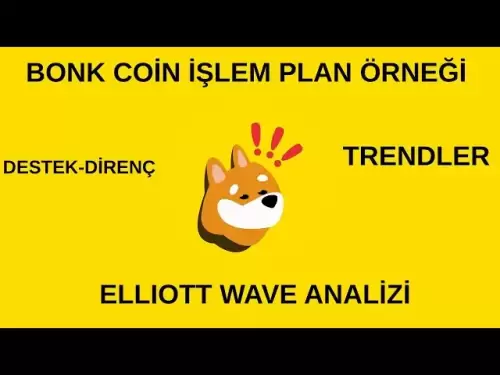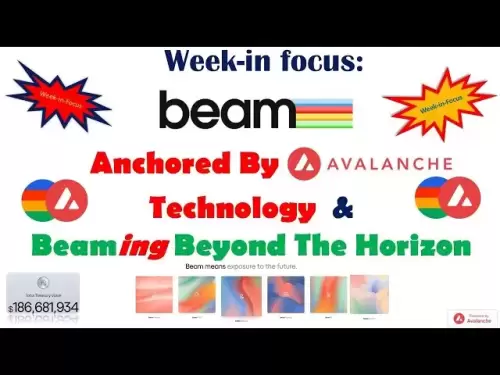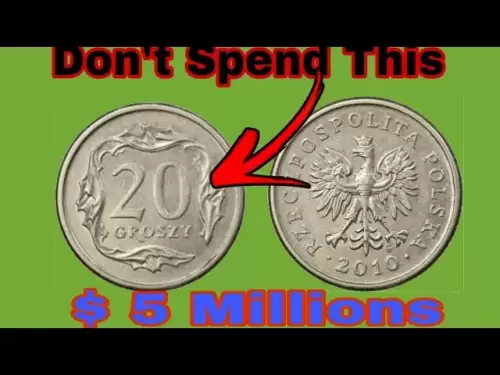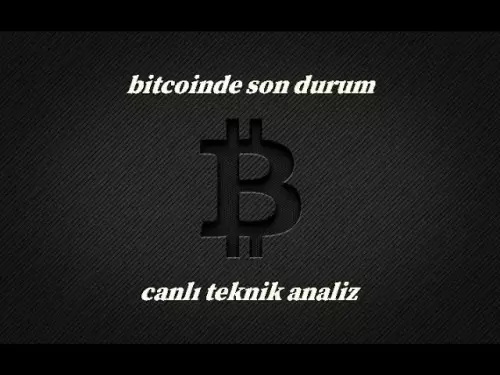-
 Bitcoin
Bitcoin $108,562.4295
0.46% -
 Ethereum
Ethereum $2,533.9553
1.52% -
 Tether USDt
Tether USDt $1.0002
-0.01% -
 XRP
XRP $2.2542
2.23% -
 BNB
BNB $662.4567
1.48% -
 Solana
Solana $151.4114
3.48% -
 USDC
USDC $0.9999
0.00% -
 TRON
TRON $0.2860
0.91% -
 Dogecoin
Dogecoin $0.1685
3.72% -
 Cardano
Cardano $0.5809
1.63% -
 Hyperliquid
Hyperliquid $39.2916
1.85% -
 Sui
Sui $2.8874
0.85% -
 Bitcoin Cash
Bitcoin Cash $496.5801
2.72% -
 Chainlink
Chainlink $13.3582
2.48% -
 UNUS SED LEO
UNUS SED LEO $9.0279
0.07% -
 Avalanche
Avalanche $18.0773
2.30% -
 Stellar
Stellar $0.2426
3.05% -
 Toncoin
Toncoin $2.9086
6.01% -
 Shiba Inu
Shiba Inu $0.0...01170
2.97% -
 Hedera
Hedera $0.1587
3.47% -
 Litecoin
Litecoin $87.4596
1.13% -
 Monero
Monero $317.0425
0.73% -
 Polkadot
Polkadot $3.3778
1.90% -
 Dai
Dai $0.9999
-0.01% -
 Ethena USDe
Ethena USDe $1.0001
-0.01% -
 Bitget Token
Bitget Token $4.4095
0.63% -
 Uniswap
Uniswap $7.3593
6.80% -
 Pepe
Pepe $0.0...09910
3.64% -
 Aave
Aave $274.7388
2.68% -
 Pi
Pi $0.4607
0.48%
How do I use the NFT marketplace on my Ledger device?
To use NFTs with your Ledger, connect it to a compatible software wallet like MetaMask, then securely interact with marketplaces like OpenSea, remembering that Ledger itself doesn't directly support marketplaces.
Mar 21, 2025 at 05:08 am
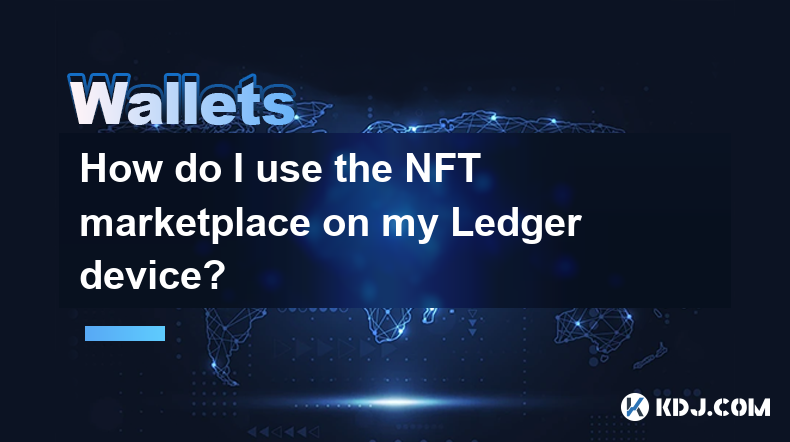
Key Points:
- Ledger devices do not directly support interacting with NFT marketplaces.
- You'll need a compatible software wallet and a connected Ledger device for secure NFT transactions.
- Understanding the risks involved with using third-party wallets and marketplaces is crucial.
- The process involves connecting your Ledger device to your chosen wallet and authorizing transactions.
- Security best practices, like using strong passwords and regularly updating firmware, are paramount.
How do I use the NFT marketplace on my Ledger device?
Ledger devices are renowned for their robust security in the cryptocurrency space. However, they don't have built-in NFT marketplace functionality. They act as a hardware security module (HSM), securing your private keys. To use NFT marketplaces, you need a compatible software wallet that integrates with your Ledger device. This setup combines the convenience of a software wallet's user interface with the security of your Ledger hardware.
Choosing the right software wallet is vital. Popular options include MetaMask, Ledger Live (with limitations), and others supporting Ledger integration. Research each wallet thoroughly to ensure compatibility with your preferred NFT marketplaces (OpenSea, Rarible, etc.) and the specific blockchain your NFTs reside on (Ethereum, Solana, etc.). Remember to verify the wallet's reputation and security measures before connecting your Ledger.
Before interacting with any NFT marketplace, ensure your Ledger device's firmware is up-to-date. Outdated firmware can introduce vulnerabilities. Download the latest firmware from the official Ledger website to minimize security risks. This crucial step helps safeguard your assets throughout the NFT transaction process.
Connecting your Ledger device to your chosen software wallet is the next step. The process varies slightly depending on the wallet, but generally involves installing the wallet extension, connecting your Ledger device via USB, and unlocking it using your PIN. The wallet will then display a prompt to confirm the connection. Always double-check the device's address displayed on the wallet matches the address shown on your Ledger screen.
Once connected, navigating NFT marketplaces is largely similar to using them without a Ledger. You'll browse listings, select NFTs, and initiate purchases or sales. However, each transaction requires confirmation on your Ledger device. This means physically approving each transaction on the Ledger's screen using its buttons, adding an extra layer of security against unauthorized actions.
Selling your NFTs requires similar steps. You'll list your NFT on the chosen marketplace, and when a buyer makes an offer, you’ll receive a transaction prompt on your Ledger. Approving this transaction on your Ledger device finalizes the sale and transfers the NFT ownership securely. Always review the transaction details (amount, recipient address, etc.) carefully before confirming.
Maintaining optimal security practices is crucial. Avoid using public Wi-Fi when interacting with your Ledger and NFT marketplaces. Use a strong, unique password for your software wallet and never share your recovery phrase (seed phrase) with anyone. Regularly back up your recovery phrase and store it securely offline.
Remember that interacting with any third-party software wallet or NFT marketplace introduces inherent risks. Thoroughly research the platform's reputation and security measures before using it. Be wary of phishing scams and fraudulent websites mimicking legitimate NFT marketplaces. Always access marketplaces through official links and verified apps.
Understanding gas fees is essential. These are transaction fees paid to the blockchain network to process your NFT transactions. The fees vary depending on network congestion. Check the estimated gas fees before confirming any transaction to avoid unexpected costs.
Using a Ledger device with an NFT marketplace doesn't directly change the inherent risks of the NFT market itself. Price volatility, market manipulation, and the potential for scams remain significant factors. Always conduct thorough research and only invest what you can afford to lose.
Frequently Asked Questions:
Q: Can I directly access NFT marketplaces from my Ledger Live app?
A: Ledger Live offers limited NFT support, primarily focusing on displaying your NFT holdings. It does not directly facilitate buying or selling NFTs through a marketplace. You need a compatible third-party wallet for that.
Q: What happens if I lose my Ledger device?
A: Losing your Ledger device itself doesn't compromise your funds if you have securely stored your recovery phrase. You can use the recovery phrase to restore your wallet to a new Ledger or a compatible software wallet. However, losing your recovery phrase means irreversible loss of access to your crypto assets.
Q: Are all NFT marketplaces compatible with Ledger?
A: Not all NFT marketplaces are directly compatible with all software wallets that integrate with Ledger. Always check the compatibility of your chosen wallet and marketplace before attempting to use them together. Some marketplaces might require specific browser extensions or wallet integrations.
Q: Is using a Ledger device with an NFT marketplace completely risk-free?
A: No, using a Ledger device significantly reduces the risk of unauthorized access to your private keys, but it doesn't eliminate all risks. Phishing scams, malicious software, and the inherent volatility of the NFT market remain potential threats. Diligence and security best practices are always necessary.
Disclaimer:info@kdj.com
The information provided is not trading advice. kdj.com does not assume any responsibility for any investments made based on the information provided in this article. Cryptocurrencies are highly volatile and it is highly recommended that you invest with caution after thorough research!
If you believe that the content used on this website infringes your copyright, please contact us immediately (info@kdj.com) and we will delete it promptly.
- Litecoin Breakout Watch: What Traders Need to Know Now
- 2025-07-06 16:50:13
- Bitcoin, Solana, Ethereum: Decoding the Latest Buzz on the Blockchain
- 2025-07-06 16:50:13
- Widnes Resident's 50p Could Be Your Ticket to Easy Street: Rare Coin Mania!
- 2025-07-06 16:55:13
- Bitcoin, Solaris Presale, and Token Rewards: What's the Buzz?
- 2025-07-06 16:55:13
- Ethereum Under Pressure: Price Drop Amid Global Uncertainties
- 2025-07-06 17:00:13
- XRP, SEC Case, and Prosperity: A New Era for XRP Holders?
- 2025-07-06 17:10:13
Related knowledge

How to cancel a pending transaction in Phantom wallet?
Jul 03,2025 at 07:21pm
Understanding Pending Transactions in Phantom WalletA pending transaction in the Phantom wallet occurs when a user initiates a transfer or interaction with the Solana blockchain, but it hasn't yet been confirmed by the network. This can happen due to various reasons such as low transaction fees, network congestion, or incorrect gas settings. It's import...

How to see the estimated value of my tokens in Phantom wallet?
Jul 04,2025 at 12:21am
What is Phantom Wallet?Phantom wallet is one of the most popular cryptocurrency wallets designed for the Solana blockchain. It allows users to store, send, receive, and manage various tokens built on Solana, including SPL tokens and NFTs. The wallet offers a user-friendly interface, making it accessible for both beginners and advanced users in the crypt...

How to lock my Phantom wallet extension?
Jul 03,2025 at 11:14am
What Is the Phantom Wallet and Why Lock It?The Phantom wallet is a popular non-custodial cryptocurrency wallet designed for interacting with the Solana blockchain. Supporting both browser extensions and mobile apps, Phantom allows users to store, send, receive, and stake SOL tokens, as well as interact with decentralized applications (dApps). Securing y...

Does Phantom wallet offer two-factor authentication (2FA)?
Jul 03,2025 at 09:00am
Understanding Phantom Wallet and Its Security FeaturesPhantom wallet is a widely used non-custodial cryptocurrency wallet that supports the Solana blockchain. It allows users to store, send, receive, and interact with decentralized applications (dApps) seamlessly. As security is a top priority for any crypto wallet user, security features like two-facto...
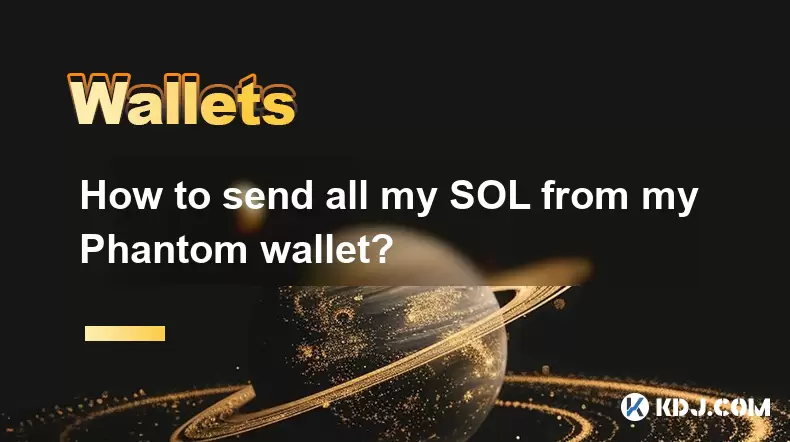
How to send all my SOL from my Phantom wallet?
Jul 06,2025 at 10:00am
Preparing to Send SOL from Your Phantom WalletBefore initiating any transaction, it is crucial to ensure that your Phantom wallet is fully set up and connected to the correct network. Phantom supports multiple networks, but for sending SOL, you must be on the Solana blockchain. Confirm this by checking the network indicator in the top-right corner of th...

What is "rent" on Solana and how does it affect my Phantom wallet?
Jul 02,2025 at 08:35pm
Understanding 'Rent' on SolanaIn the context of Solana, the term 'rent' refers to a storage fee that users pay for maintaining data on the blockchain. Unlike Ethereum, where storage costs are paid once via gas fees during contract deployment, Solana implements a recurring cost model to ensure efficient usage of network resources. This means that any acc...

How to cancel a pending transaction in Phantom wallet?
Jul 03,2025 at 07:21pm
Understanding Pending Transactions in Phantom WalletA pending transaction in the Phantom wallet occurs when a user initiates a transfer or interaction with the Solana blockchain, but it hasn't yet been confirmed by the network. This can happen due to various reasons such as low transaction fees, network congestion, or incorrect gas settings. It's import...

How to see the estimated value of my tokens in Phantom wallet?
Jul 04,2025 at 12:21am
What is Phantom Wallet?Phantom wallet is one of the most popular cryptocurrency wallets designed for the Solana blockchain. It allows users to store, send, receive, and manage various tokens built on Solana, including SPL tokens and NFTs. The wallet offers a user-friendly interface, making it accessible for both beginners and advanced users in the crypt...

How to lock my Phantom wallet extension?
Jul 03,2025 at 11:14am
What Is the Phantom Wallet and Why Lock It?The Phantom wallet is a popular non-custodial cryptocurrency wallet designed for interacting with the Solana blockchain. Supporting both browser extensions and mobile apps, Phantom allows users to store, send, receive, and stake SOL tokens, as well as interact with decentralized applications (dApps). Securing y...

Does Phantom wallet offer two-factor authentication (2FA)?
Jul 03,2025 at 09:00am
Understanding Phantom Wallet and Its Security FeaturesPhantom wallet is a widely used non-custodial cryptocurrency wallet that supports the Solana blockchain. It allows users to store, send, receive, and interact with decentralized applications (dApps) seamlessly. As security is a top priority for any crypto wallet user, security features like two-facto...

How to send all my SOL from my Phantom wallet?
Jul 06,2025 at 10:00am
Preparing to Send SOL from Your Phantom WalletBefore initiating any transaction, it is crucial to ensure that your Phantom wallet is fully set up and connected to the correct network. Phantom supports multiple networks, but for sending SOL, you must be on the Solana blockchain. Confirm this by checking the network indicator in the top-right corner of th...

What is "rent" on Solana and how does it affect my Phantom wallet?
Jul 02,2025 at 08:35pm
Understanding 'Rent' on SolanaIn the context of Solana, the term 'rent' refers to a storage fee that users pay for maintaining data on the blockchain. Unlike Ethereum, where storage costs are paid once via gas fees during contract deployment, Solana implements a recurring cost model to ensure efficient usage of network resources. This means that any acc...
See all articles























